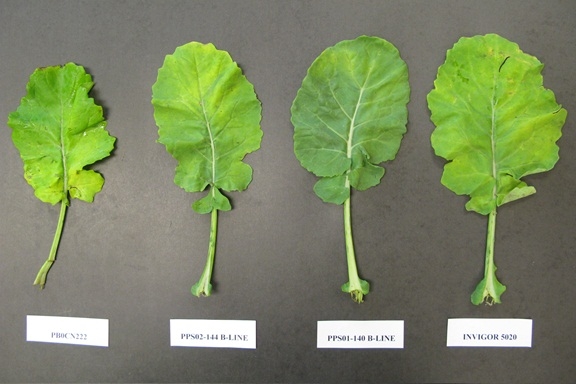PB0CN222
| Denomination: | 'PB0CN222' |
|---|---|
| Botanical Name: | Brassica napus |
| Applicant/Holder: |
BASF Agricultural Solutions Seed US LLC 100 Park Avenue Florham Park, New Jersey 07932 United States of America |
| Breeder: |
Stewart Brandt, Bayer CropScience Inc., Saskatoon, Saskatchewan |
| Agent in Canada: |
BASF Canada Inc. Site 600, Box 117 RR#6 Saskatoon, Saskatchewan S7K 3J9 Canada Tel: 306-371-6226 |
| Application Date: | 2011-07-19(priority claimed) |
| Application Number: | 11-7332 |
| Protective direction granted: | 2011-07-19 |
| Grant of Rights Date: | 2013-06-21 |
| Certificate Number: | 4555 |
| Exemption from compulsory licensing: | Yes |
| Expiry date for exemption from compulsory licensing: | 2015-06-21 |
| Grant of Rights Termination Date: | 2031-06-21 |
Variety Description
Varieties used for comparison: 'PPS01-140 B-Line', 'PPS02-144 B-Line' and '5020'
Summary: 'PB0CN222' flowers earlier than 'PPS01-140 B-Line'. The beak of 'PB0CN222' is longer than 'PPS01-140 B-Line'. 'PB0CN222' has a longer pedicel than 'PPS01-140 B-Line' and '5020'. At maturity, the plant height of 'PB0CN222' is shorter than 'PPS01-140 B-Line'.
Description:
PLANT: open pollinated maintainer line for PA0CN122, spring type, short height at maturity
COTYLEDON: wide, long
LEAF: medium green, few lobes, sharp margin, medium density of medium depth dentations, long, medium to wide width, medium to long petiole
FLOWER PETAL: yellow, long, medium to wide width
SILIQUE: horizontal attitude, medium to long length, long beak, medium to long pedicel
SEED: black
AGRONOMIC CHARACTERISTICS: fair resistance to lodging
QUALITY CHARACTERISTICS: erucic acid is 0.02% of total fatty acids, oil content is 48.6% of whole dried seed, protein is 45.9% of dried oil free meal, low glucosinolates (10.17 µmol/g)
DISEASE RESISTANCE: resistant to Blackleg (Leptosphaeria maculans asexual stage: Phoma lingam) and resistant to Clubroot (Plasmodiophora brassicae)
Origin & Breeding History: 'PB0CN222' is the male fertile maintainer line of 'PA0CN122'. It is the non transgenic line derived from crossing a doubled haploid line 98-55-013 to line 07NN001207, and then using 98-55-013 as a recurring parent in a backcrossing scheme. The final backross was done it 2009. 'PB0CN222' was selected in 2007 and 2008 on the basis of per se performance of height, vigour, maturity, blackleg resistance, clubroot tolerance, oil content, fatty acid profile and glucosinolate content.
Tests & Trials: Trials were conducted in the summers of 2010 and 2011 in Saskatoon, Saskatchewan. Plots each year consisted of 3 rows with a row length of 6 metres and a row spacing of 50cm. In 2010, the trial was set up as 8 x 9 lattice with 3 replications. In 2011, the trial was set up as a RCB Design with 3 replications. There were 40 measurements of the cotyledon characteristics, 30 of the leaf, flower and plant height characteristics and 60 for the silique characteristics. Means are based on a two year average. Differences are significant at the 2% probability level based on LSD values.
Comparison tables for 'PB0CN222' with reference varieties 'PPS01-140 B-Line', 'PPS02-144 B-Line' and '5020'
Days to flowering
| 'PB0CN222' | 'PPS01-140 B-Line' | 'PPS02-144 B-Line' | '5020' | |
|---|---|---|---|---|
| mean | 37 | 41 | 37 | 38 |
Beak length (mm)
| 'PB0CN222' | 'PPS01-140 B-Line' | 'PPS02-144 B-Line' | '5020' | |
|---|---|---|---|---|
| mean (LSD=2.1) | 13.6 | 6.3 | 14.1 | 13.0 |
| std. deviation | 1.6 | 1.3 | 1.9 | 1.6 |
Pedicel length (mm)
| 'PB0CN222' | 'PPS01-140 B-Line' | 'PPS02-144 B-Line' | '5020' | |
|---|---|---|---|---|
| mean (LSD=1.3) | 19.1 | 15.7 | 19.0 | 16.9 |
| std. deviation | 2.5 | 1.8 | 1.9 | 1.7 |
Plant height at maturity (cm)
| 'PB0CN222' | 'PPS01-140 B-Line' | 'PPS02-144 B-Line' | '5020' | |
|---|---|---|---|---|
| mean (LSD=12) | 99 | 116 | 97 | 106 |
| std. deviation | 10 | 10 | 8 | 8 |
Click on image for larger view

Canola: 'PB0CN222' (far left) with reference varieties 'PPS02-144 B-Line' (centre left), 'PPS01-140 B-Line' (centre right) and '5020' (far right)
- Date modified: